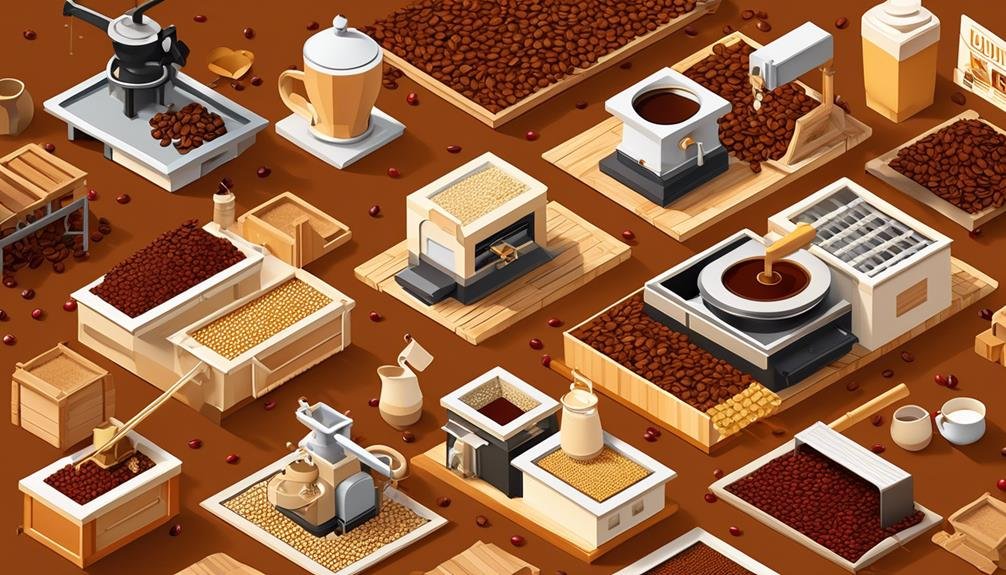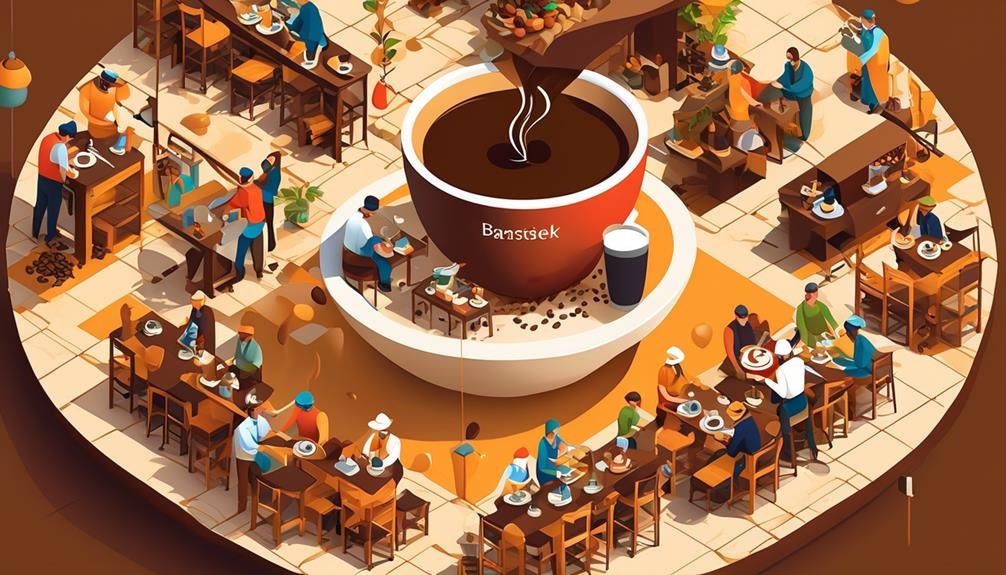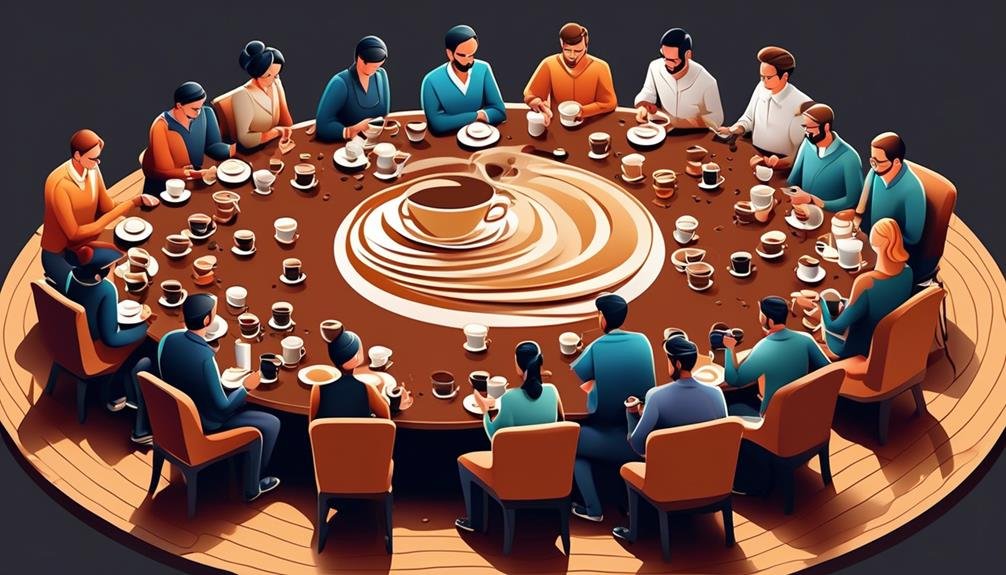So, you've always been intrigued by the aroma and flavors of coffee, and you're wondering how to turn your passion into expertise as a coffee taster or 'cupping' expert.
Well, the journey to becoming a connoisseur begins with a thirst for knowledge and a dedication to honing your sensory skills. From understanding coffee origins and processing methods to mastering the art of cupping, there's a whole world of exploration waiting for you.
But that's just the beginning. To find out what it takes to become a true expert in the realm of coffee tasting, you'll need to uncover the secrets of building a network in the industry, pursuing professional certifications, and continuously refining your skills.
So, grab a cup of your favorite brew and let's embark on this flavorful adventure together.
Key Takeaways
- Practice cupping regularly to develop palate and tasting skills
- Gain knowledge about coffee origins, including the growing process, varieties, geography, and processing methods
- Understand the different coffee processing methods and how they shape flavors and characteristics
- Learn the art of cupping and focus on evaluating key elements such as cleanness, sweetness, acidity, mouthfeel, and aftertaste
Developing Your Palate for Coffee Tasting
To become an expert coffee taster and truly appreciate the intricacies of this beloved beverage, it's imperative to develop your palate through the practice of cupping and the cultivation of your sensory abilities. Cupping is a technique used by coffee experts to evaluate coffee quality, and it involves carefully observing the characteristics of each brew. As you embark on this journey, you'll focus on identifying key elements such as cleanness, sweetness, acidity, mouthfeel, and aftertaste. By allowing the brew to cool before tasting, you can fully experience the flavors that unfold.
Training your senses to recognize coffee aroma, acidity, and body is essential. The aroma of coffee can be complex, with hints of fruits, nuts, or even chocolate. Acidity refers to the perceived brightness or liveliness of the coffee, which can range from tart to citrusy. Body, on the other hand, relates to the texture and weight of the coffee in your mouth. These sensory skills will enable you to discern the nuances in different coffee varieties and understand how factors like weather, altitude, and processing influence flavor.
As you delve deeper into the world of coffee tasting, consider exploring the resources provided by the Specialty Coffee Association. They offer courses and certifications, such as the Q Grader exam, which will expand your knowledge and refine your palate. Additionally, the Nez du Café Aroma Kit can help you develop your olfactory abilities and enhance your sensory experience.
Gaining Knowledge About Coffee Origins
Gain a comprehensive understanding of coffee origins by immersing yourself in the fascinating world of coffee growing, varieties, geography, processing methods, and cupping sessions. To truly appreciate the complexities and nuances of coffee, it is essential to delve into the origins of this beloved beverage. Let's explore the key aspects that will expand your knowledge about coffee origins.
| KEY ASPECTS |
|---|
| Coffee Growing Process |
| Coffee Varieties |
| Coffee Geography |
| Coffee Processing Methods |
| Cupping Coffees from Various Origins |
Firstly, familiarize yourself with the coffee growing process. Understanding the journey from planting to cultivation and harvesting in different coffee-growing regions will shed light on the hard work and dedication that goes into producing high-quality beans.
Next, delve into the world of coffee varieties. Arabica and Robusta are the most well-known species, each offering unique flavors and characteristics that contribute to the diverse coffee profiles found worldwide.
To gain a deeper appreciation for coffee origins, study the geography that influences flavor. Factors such as altitude, climate, and soil play a crucial role in shaping the taste profile of coffees from different regions.
Additionally, research the various processing methods used in the coffee industry. Whether it's the washed, natural, or honey process, each method imparts distinct flavors and aromas to the beans, further enhancing the diversity of coffee origins.
Understanding Coffee Processing Methods

Now that you have gained a comprehensive understanding of coffee origins and the key aspects that contribute to the diverse profiles of different coffees, let's explore the fascinating world of coffee processing methods.
- Dry processing (natural): This method involves sun-drying the whole coffee cherry, allowing the coffee seed to have extended contact with the fruit. The result is a fruitier and full-bodied flavor, with subtle notes of sweetness and complexity.
- Wet processing (washed): In this method, the outer skin and pulp of the coffee cherry are removed before fermenting and washing the seeds. Wet processing yields a cleaner and brighter flavor profile, with pronounced acidity and floral or citrus notes that are characteristic of many specialty coffees.
- Honey processing: With this method, the skin and pulp are removed, but some mucilage is left to dry with the seeds. This adds sweetness and complexity to the coffee's flavor, resulting in a unique profile that can range from caramel-like sweetness to fruity and floral undertones.
Coffee processing methods play a crucial role in shaping the flavors and characteristics found in coffee. Whether you're a coffee buyer, a coffee enthusiast, or simply someone who appreciates the art of coffee, understanding these methods allows you to appreciate the hard work and expertise that goes into producing your favorite cup of joe.
Coffee companies invest in highly trained professionals who undergo challenging tests and training programs, such as the du Café Aroma Kit, to develop their sensory skills and ability to discern the unique flavors and aromas found in different processing methods.
Learning the Art of Cupping
Immerse yourself in the captivating world of coffee tasting and become a true connoisseur of the art of cupping. Cupping is a method used by coffee professionals to evaluate the quality and characteristics of different types of coffee. It involves smelling and tasting the coffee to identify its unique flavors, aromas, and nuances. To learn the art of cupping, start by understanding the basics of coffee tasting and cupping techniques. Focus on evaluating cleanness, sweetness, acidity, mouthfeel, and aftertaste. Practice regularly and explore a variety of coffee tastes and flavors to build your expertise.
Here is a table to help you understand the different scents that are commonly found in coffee:
| Scents | Description |
|---|---|
| Floral | Fragrances reminiscent of flowers |
| Fruity | Aromas resembling fruits |
| Nutty | Smells similar to nuts |
| Spicy | Aromatic spices like cinnamon or clove |
To differentiate coffee, you can try blind samples, where you taste coffee without knowing its origin or roast level. This helps develop your palate and enhances your ability to identify specific flavors. Additionally, consider taking multiple-choice questions about roasting to deepen your understanding of the coffee production process.
Building a Network in the Coffee Industry

To expand your horizons and connect with like-minded individuals in the coffee industry, it's essential to build a strong network that can propel your journey as a coffee taster or cupping expert. Here are three key ways to build your network in the coffee industry:
- Attend coffee industry events and trade shows: These events are great opportunities to meet professionals from all aspects of the coffee industry. By attending, you can connect with different people who share your passion for coffee and gain valuable insights into the latest trends and techniques.
- Join coffee tasting and cupping workshops: Participating in these workshops allows you to interact with experienced tasters and industry experts. Not only will you improve your own tasting skills, but you'll also have the chance to network with professionals who've extensive knowledge and experience in the field.
- Engage with online coffee communities and social media groups: The coffee industry has a strong online presence, with various forums, communities, and social media groups dedicated to coffee enthusiasts and professionals. By actively participating in these platforms, you can connect with industry peers, share your experiences, and learn from others in the field.
Building a network in the coffee industry is crucial because it exposes you to different perspectives, techniques, and ideas. It allows you to learn from the best tasting professionals and make connections with people who produce, roast, and distribute coffee. So, make sure to seize every opportunity to expand your network and nurture relationships within the coffee community.
Pursuing Professional Certifications
When pursuing professional certifications in the coffee industry, it's crucial to research and identify the right certification program that aligns with your goals and aspirations as a coffee taster or cupping expert. One reputable certification to consider is the Q Grader, offered by the Coffee Quality Institute (CQI). This certification is recognized globally and is highly regarded in the industry.
To pursue this certification, you need to review the specific qualifications and experience required, as it's a rigorous process that tests your sensory skills, knowledge of coffee, and ability to evaluate and grade coffee samples. Additionally, enrolling in training programs approved by the Specialty Coffee Association (SCA) can help you gain advanced knowledge and sensory skills. These programs focus on various aspects of coffee tasting, including cupping, sensory analysis, and quality control.
To prepare for the challenging certification exam, it's important to study SCA protocols, practice your sensory skills, and use aroma kits for olfactory test practice. Lastly, remember to stay informed about recertification requirements to maintain your professional certification and continue advancing your expertise in coffee tasting.
Pursuing professional certifications is an essential step in becoming a skilled coffee taster or cupping expert, and it demonstrates your commitment to excellence in this field.
Continuously Refining Your Coffee Tasting Skills

As you continue your journey towards becoming a skilled coffee taster or cupping expert, the next step is to continuously refine your coffee tasting skills through regular practice, sensory exercises, industry events, and exploration of new coffee varieties.
- Practice regular cupping sessions: One of the most effective ways to refine your coffee tasting skills is through regular cupping sessions. Cupping involves evaluating the aroma, flavor, and overall quality of coffee samples. By consistently practicing cupping, you can develop and refine your palate, becoming more attuned to the unique characteristics of different coffees.
- Engage in sensory exercises: Improving your ability to recognize aromas and flavors is crucial for becoming a skilled coffee taster. Engage in sensory exercises that focus on enhancing your sense of smell and taste. These exercises can include blind taste tests, aroma identification, and flavor recognition training.
- Attend coffee tasting events and workshops: Take advantage of industry events and workshops to learn from experienced coffee tasters and cupping experts. These events provide opportunities to expand your knowledge, discover new techniques, and gain valuable insights into the world of coffee tasting.
Frequently Asked Questions
How Do You Become a Coffee Taster?
You become a coffee taster by immersing yourself in the world of coffee. Learn about different beans, brewing methods, and flavor profiles. Practice tasting and refining your palate. Seek out opportunities to work in the industry and continue learning from experts.
How Can I Become a Coffee Expert?
To become a coffee expert, immerse yourself in the world of coffee. Learn about different beans, brewing methods, and flavor profiles. Practice cupping to refine your palate. Seek opportunities in the industry to gain experience and knowledge.
What Is a Coffee Tasting Expert Called?
A coffee tasting expert is called a cupping expert. They use the cupping technique to evaluate coffee quality, focusing on characteristics like cleanness, sweetness, acidity, mouthfeel, and aftertaste. It's a skill that requires practice, experience, and a deep understanding of coffee flavors and qualities.
How Much Does It Cost to Become a Q Grader?
Becoming a Q Grader, a coffee tasting expert, can cost several thousand dollars. This includes certification, study materials, and recertification. However, it's a worthwhile investment for those passionate about coffee and seeking expertise in cupping.
Conclusion
Now that you have delved into the world of coffee tasting and cupping, you're well on your way to becoming an expert in the field. By gaining knowledge, honing your sensory skills, and pursuing professional certifications, you have laid a solid foundation for your journey.
Remember to continuously refine your skills, explore different tastes and flavors, and build a network within the coffee industry. With passion and dedication, you'll surely become a true coffee connoisseur.
Cheers to your caffeine-fueled adventure!




